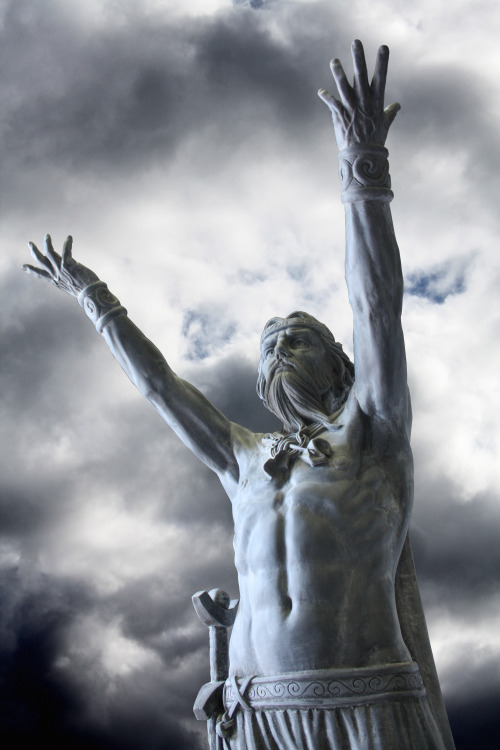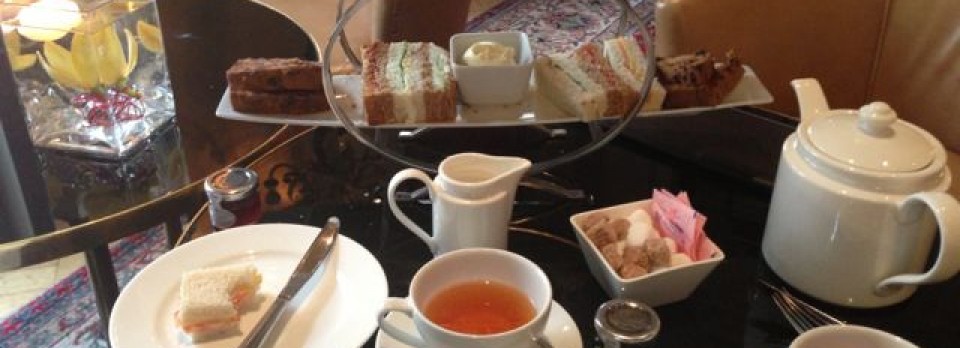Manannán mac Lir, the son of the Sea, was a prominent figure in ancient Irish religion. He also appears in Scottish and Manx legends, and the Isle of Man may be named after him. A fine contemporary statue of Manannán at Binevenagh Mountain in County Derry in Northern Ireland was stolen in 2015, and had to be replaced. The culprits left a wooden cross with the words “You shall have no other gods before me.” Apparently they were disturbed by the presence of a pre-Christian god. Little do they realize that Manannán will always be in Ireland, whether they tear down his statues or not.

Manannán statue by sculptor John Sutton, who worked on the “Game of Thrones” TV series.
51. The Pearl
Fand rose from her bower, troubled. In her mind’s eye, the shining figure of her husband, Manannán, drove his chariot through fields of purple flowers, but he sped in the wrong direction, away from her. He reached the sea, where Enbarr of the flowing mane drew his chariot lightly over the waves, while the fish leapt and the dolphins and seals cavorted about him.
My husband! Her spouse was Manannán mac Lir, the son of the Sea. Suddenly she heard his voice as though from a great distance. “Fand, my pearl, my glistening teardrop. I am leaving you for a time. Farewell.”
Fand was unhappy, bereft. She combed out her silver hair and gazed into her mirror. Had her beauty lost its luster? No. She looked as she always did. Her body gave off its pearlescent sheen, and her thick tresses reached the back of her knees. Between her legs the hair was fine, silvery white, and downy. The skin of her breasts and belly and thighs was as soft as a newborn babe’s, and her body emitted the scent of flower petals. Nothing had changed. Therefore, Manannán mac Lir would return to her.
But he did not return. She plucked her harp, sang the songs of the Tuatha Dé Danann and the elder races, played fidchell with her sister Lí Ban, nibbled at platters of fruit, and amused herself by changing the color of her hair and eyes, imagining Manannán’s delight when he returned to see her all dark as a crow, or rosy as a crystal cup of wine. After a long time of waiting, she grew despondent.
“Lugh!” she cried out. “Lugh of the Long Arm! Where are you? Fand has need of you.”
Lugh came in his own time, his naked body golden and glowing as always.
“Lugh! Where is your foster-father, my sweet Manannán, son of the Sea?” she asked. “Know you where he has gone? He has left me, and I am heartsick.”
“Foster-mother, he has gone to his Isle, in which he delights, the Isle of Apple Trees that lies like a jewel in the sea. A selkie caught his fancy there, and he stays, dallying with her and taking his pleasure.”
“Lugh, make him return to me. I am his wife. I am your foster-mother. Go to him and threaten him with your spear if he does not return.”
Lugh looked doubtful. “No, Fand. When I went to aid the people of Danu against the Fomori, Manannán gave me his coat that could not be pierced, and his sword, the Answerer, from the wound of which no opponent recovers. Together with my spear, these carried the day. I will not gainsay the will of Manannán. While you are waiting, why not look about you and find amusement elsewhere, with another one of us? Óengus, perhaps, the Dagda’s son? He is very comely, a poet who can teach you many a sweet song. And they say his spear is a Great Fury,” he added, winking at her.
“Nay, nay,” she answered impatiently. “Óengus loves another, a mortal girl for whose sake he lay sick a long time. She has gone from his sight, and he scours the land of Éire for her, flying hither and thither in the likeness of a swan.”
“Then take a mortal lover yourself. I have done so,” said Lugh, his light glowing brighter as he spoke.
“A mortal?” she asked, frowning. “This I have never desired. Manannán, whose body exhales the scent of the sea, never left me alone before. Surely no pleasure can be had from such creatures of a day, good Lugh?”
“Creatures of a day they may be, foster-mother,” he said, “but know you not that mortals are reborn each time their bodies fail? Why, their spirits have lived as long as ours, only they seldom remember, except in their deepest dreams.”
“This seems a foolish pastime, to ally oneself with such as they,” she said, still unconvinced. But she was curious too. “Lugh, have mortal men and women the same bodies as we, the same graces, the same parts?”
He laughed. “You’ve never looked, foster-mother? This you must discover for yourself.” And with these parting words, he thrust his right arm skyward, and climbed into the heavens, emitting a brilliant light as he went.
The next day, her sister Lí Ban, the wife of Labraid Swifthand, came to her in tears. “Senach the Crooked and Eoghan of River’s Mouth are marching against my husband with their allies,” she said. “I have long feared this, Sister. They are too many for Labraid and his hosts, even though he is a great warrior.”
“You need a champion,” said Fand. “Is there none among our kindred who will come to the aid of your brave Labraid?” She was fond of Labraid, and had no wish to see his lands forfeited to his enemies, nor indeed those Lí Ban had brought to him upon their marriage.
“None,” said Lí Ban. “I have visited every Sídhe lord, and there is none to help us. But when I asked Lugh for advice, he said I ought to search among the mortals of Éire, for there was one of his blood who was worthy to be our champion.”
Recalling her own conversation with Lugh, Fand was intrigued. “Let us see what manner of man he is.” She led Lí Ban to the pool of salt water in her house, which was fed from the depths of the sea and drained there again. The house she shared with Manannán held two of these pools, one salt and one fresh. Sometimes strange creatures surfaced in the salt pool, creatures which frightened Fand with their needlelike fangs and huge pale eyes; but other times the waters frisked with silvery fish, who danced on the surface for her delight. Now she and Lí Ban began to chant to Lir, asking for an aisling of the blood of Lugh in Éire. They sang for a long time, and at last the waters grew still as a mirror, and they looked upon the face of a dark man whose mournful eyes held many colors. He and another hero were amusing themselves with weapon feats, and as the other cast holly and yew spears at him, the dark one plucked them from the air.
Fand laughed for delight. “Though he is not large, nor golden,” she said, “yet this one has the long arm of Lugh, and his look.” As she watched, Lí Ban smiled and said, “Sister, this is your first laughter since Manannán left.”
“There is no time to be lost,” answered Fand. “We must draw near to this hero and seek his aid.”
Copyright 2017 by Linnet Moss
Notes: I always imagine Manannán as looking a lot like the Greek sea god Poseidon. Poseidon was known for speeding over the waves in a chariot drawn by mer-horses (hippocampi). Manannán had his steed Enbarr of the Flowing Mane, who drew his chariot over the sea.

Poseidon in a late Roman mosaic from Tunis. Source: Theoi.com.

Like Manannán, Poseidon had a wife, Amphitrite. This is a mosaic from late Roman Algeria.

A nice post to kick start my bank holiday Monday. Ireland seems to have a vast pantheon of gods, demons,powerful and beautiful rulers imbued with magic powers. My Grandmother came from Ireland so I learned a lot of myths and legends at her knee.
Oh how lucky, to learn such legends through a family tradition! I lack Irish ancestors, it seems, but have been attracted to the culture for *other* reasons. Still, I love the mythologies of all cultures.
I like that 😊
Thank you, loshame!
Follow me if you like my blog 😀.
Loving these glimpses into such a rich past – vibrantly written! 😺
Thanks, this is one of my favorite chapters, especially since the saga gave me very little to base it on, so most details of Fand’s story came straight out of my head!
A beautifully written piece of mythology. I could see Fand in her silvery glory so clearly in my ‘minds eye.’
Thanks Lisa, that’s music to my ears!